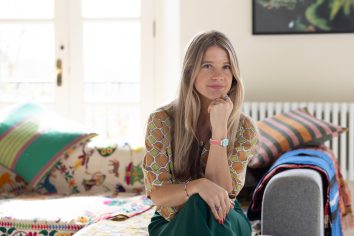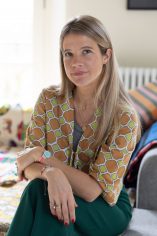I remember my first pregnancy as a series of fragmented snapshots: me, aged 25, on the floor of my bedroom, shaking with shock as I watched the second line emerge on the pregnancy test. A few weeks, later trying on maternity clothes in Topshop, smiling as I imagined my belly expanding over the following months. Later that afternoon, the feeling of liquid pouring down my leg as I walked home from the Tube station. That evening, the doctor’s mouth moving as she explained the procedure known as a ‘sweep’ – necessary to clear my womb of any debris from the foetus I had just lost – as swiftly and as unexpectedly as I had learned I was pregnant.
The experience of having a miscarriage at almost three months filled me with a deep well of sadness, a feeling that sat fundamentally at odds with the doctor’s reassurance that this was a common occurrence, and that, at this stage, the life inside me had been nothing more than a collection of cells. My sadness was unalleviated by the well-meaning close friends, who reassured me that one in four pregnancies fail to thrive and end in spontaneous miscarriage, or to hear that I was still just as likely to have a healthy baby one day. I had already redrawn my future with this particular baby at the centre of it. This was my baby. I had loved it, and now it was gone, and only a handful of people knew it had ever existed. I was heartbroken.
My sadness was unalleviated by the friends who reassured me that one in four pregnancies fail to thrive and end in spontaneous miscarriage, or to hear that I was just as likely to have a healthy baby one day
Perhaps one of the reasons why many of us simply don’t know what to say is because so little is known about why miscarriages happen, why they sometimes recur and, ultimately, how to prevent them. Beyond the stock advice (not to smoke, drink or eat certain foods), miscarriage and stillbirth have long been subjects that are rarely discussed or carry the stigma of failure, and yet, once you start to talk, it’s hard to find someone who hasn’t been affected. Julia Bueno, 46, is the author of The Brink Of Being: Talking About Miscarriage, one of a number of new books this year seeking to open up the conversation around baby loss, alongside online movements, including psychologist and maternal-health campaigner Dr Jessica Zucker’s social-media drive #IHadAMiscarriage, launched to raise awareness and create a community.
Bueno had her first miscarriage nearly 20 years ago, at 30, when she lost twins. She subsequently discovered she had an abnormal-shaped uterus, and now has two sons, aged nine and 16. Struck by the impact of her experience of recurrent miscarriage, Bueno retrained as a psychotherapist and support worker for The Miscarriage Association. ‘I had learned the value of talking to someone who was prepared to listen and be genuinely curious and understanding about my experiences, and I wanted to offer the same,’ she says.
Despite its prevalence, we have long been unable to talk about miscarriage in any adequate breadth or depth
In her book, she recalls the stories of the hundreds of women she has met over 15 years in consulting rooms. Her aim is to give a voice to those who remain unheard and bring to light the questions that their stories raise about how we as a society have traditionally discussed – or, rather, not discussed – the grief of baby loss. ‘Most miscarriages happen even before they have been revealed to the world, or even suggested by the hint of a pregnancy bump. This event can be devastating, physically painful, or both. And yet, despite its prevalence, we have long been unable to talk about miscarriage in any adequate breadth or depth,’ she says. ‘If we do, we tend to do so awkwardly, quickly, and in the most general terms. We squirm, we whisper, and we avoid asking questions. We just don’t understand the experience well enough, or the complex grief that can hit hard in its wake,’ she says. But sometimes, when baby loss occurs after birth, following months of anticipation, the conversation can be even harder.
Jennie Agg, 32, uses her blog, uterusmonologues.com, to document her personal life after the recurrent miscarriages she had between January 2017 and June 2018. On her Instagram, @jenniemonologues, she explains why she continues to write about the subject: ‘I write because miscarriage is sadly normal, but it is not yet normalised. If two years ago I’d had a baby instead of a miscarriage, and continued to post about it now, sharing my experience of motherhood, no one would think it remotely strange. Yet somehow writing and talking about the other side of that sliding-doors moment still feels like a statement.’
‘Time has helped, as well as forms of therapy. I have also started writing about my experience, as a way to work through my feelings and open up more’
While miscarriage is most likely to happen in the first 12 weeks of pregnancy, it can occur up until the 24-week point, when it is then deemed a stillbirth in the UK. There is, however, ongoing debate over the terminology. Last year, mother-of-three Kayleigh Parnham, who was carrying a baby she knew would die at birth, led a campaign for parents to be given the option of having a birth certificate for their dead babies, even if they were born before 24 weeks.
Freya Hodges*, 38, has had six miscarriages, one of which was at 20 weeks. She also has a seven-year-old son, who was born following a perfectly healthy pregnancy and home birth. ‘Miscarriage is a personal thing. Some people want to talk about it, but at first I didn’t. Losing a baby at 20 weeks is still called a miscarriage, albeit a “late-term miscarriage”, which in a way doesn’t matter, after all, it’s just a name, a label, but it felt like much more than a miscarriage to me,’ she says. ‘He was tiny, the size of my hand. We sat with him for a few hours before going home. We then had to arrange a funeral for him. I was all over the place, but eventually we had him cremated and now keep his ashes in a special basket at home. We also had a special brass leaf made, engraved with his name, Juno, which is at the crematorium.’
It has been two years since she said goodbye and, for Hodges, the healing process has been ongoing. ‘There are no answers for what happened. Our son had a post-mortem and they found nothing wrong. There was nothing wrong with me or my blood tests, there was nothing wrong with the placenta – it was just bad luck,’ she says. ‘I spent the first two months after his loss drinking every night; I constantly felt incredibly anxious. Time has helped, as well as forms of therapy, such as Reiki healing, reading, yoga, meditation and spending more time in nature. I have also started writing about it, as a way to work through my feelings and open up more.’
Most Viewed
Opening up a dialogue doesn’t necessarily mean talking. The point is to listen, to give space to one another, to allow people to sit with their own stories whether they choose to talk or not
Elle Wright, 33, is the author of new memoir Ask Me His Name: Learning To Live And Laugh After The Loss Of My Baby. Wright’s son, Teddy, died three days after his birth, in 2016, of a very rare metabolic condition that meant everything was poisonous to him – even the air he was breathing. Having amassed a 106,000-strong following on her Instagram handle @feathering_the_empty_nest, Wright provides a safe space for women to converse about the life and death of babies at all stages. For her, the motivation to share her story was partly about being acknowledged as a mother. ‘As I watched mothers holding their babies and rocking them in their prams, I wanted to scream, “I’m a mother, too, you know,”’ she says.
I am hugely lucky to now have three children, aged eight, five and three. While there is the temptation to cite my own happy ending when consoling friends who continue to miscarry, I have learned to resist the temptation because their story isn’t mine, just as mine wasn’t anyone else’s. Opening up a dialogue doesn’t necessarily mean talking. The point surely is to listen, to give space to one another, to share, and to allow people to sit with their own stories whether they choose to talk or not; to know that their experience has not only been felt but heard and understood.
For support, go to miscarriageassociation.org.uk, or email info@miscarriageassociation.org.uk
More in Features
‘A rising star of British thriller writing.’
By Staff, 23rd July 2024Features 'I arrived to meet Charlotte Philby, granddaughter of a spy, and left having interviewed Charlotte Philby, one of the rising stars of British thriller writing.' Sunday Times Culture interview by Tim Shipman
THE END OF SUMMER reviews
By Staff, 4th July 2024Features ‘A standout literary thriller.’ THE FT ‘Ingenious, intriguing, colourful and very entertaining, this is the ideal summer holiday novel.’ LITERARY REVIEW
THE END OF SUMMER – Sunday Times thriller of the month
By Staff, 10th June 2024Features 'In short: an enthralling, multilayered triumph.' THE END OF SUMMER reviewed in this month's Sunday Times
Introducing DIRTY MONEY: announcement in The Bookseller
By Staff, 19th May 2024Features The first quotes are in for my new Farrow & Chang series, publishing with Baskerville in early 2025
Exclusive excerpt: THE END OF SUMMER
By Staff, 7th December 2023Features Read the prologue from my forthcoming novel - 'a bold, nuanced literary thriller dripping with secrets and deadly glamour’ - publishing in June 2024
THE END OF SUMMER announced in The Bookseller
By Staff, 6th November 2023Features My new literary suspense THE END OF SUMMER announced in The Bookseller
From book to screen
By Charlotte Philby, 28th February 2023Features Free resources and tips for would be screenwriters, from a complete novice - and some professionals - as I navigate the process of adapting my novels for TV and film
‘A tremendous achievement’ William Boyd
By Charlotte Philby, 20th April 2022Features A Sunday Times best book of the month, here is Edith and Kim in review - and where to find signed first editions
Observer New Review Q&A
By Staff, 22nd March 2022Features An interview with Stephanie Merritt about Edith and Kim, the perils of writing about family, and why female spies often get overlooked
Researching Edith and Kim
By Staff, 17th November 2021Features From a compendium of stories about life at the Bauhaus to a Modernist memoir by the founder of the iconic Isokon, here are some of the books that inspired my forthcoming novel





